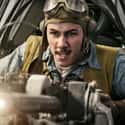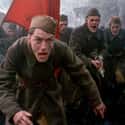-
(#9) Battles Are Usually Fought On Smooth Terrain In Perfect Weather
The Trope: It does seem mighty convenient that so many WWII battles happened to take place during the sort of weather, and on the sort of terrain, that are particularly conducive to easy filming.
Why Is It Inaccurate?: Of course, the real WWII was fought in every type of weather imaginable, and on terrain as diverse as, well, the bulk of Europe and the Pacific Theatre. In fact, weather good and bad played such an important role in the war the Germans initially suffered from their lack of prognostication ability, until they made a point of invading two prime weather-watching nations in Denmark and Norway in 1940.
Some battles that have been rendered on the silver screen as having pristine conditions, like the Battle of the Bulge or D-Day, actually featured rough terrain and rougher weather as a defining factor. As Normandy vet Ray Pegram remembers:
I remember with first glider tow, we hit a fog bank and we were very nervous, but the formation separated by pattern, according to plan…Clouds prevented them from dropping to the ground close together, like they wanted to. Because of the cloud cover, we had to break formation, so the first drops were very scattered. They had a hard time assembling on the ground because they were so scattered. But the next drops, we could do a better job putting them down together.
Notable Offenders: Battle of the Bulge, The Great Escape, The Longest Day
-
(#11) People Carried On Casual Conversations Over All The Noise
The Trope: Amid the chaos of battle, two or more troopmates engage in pages full of dialogue, most of which centers around what they’d each like the other to tell their wives if they don’t make it.
Why Is It Inaccurate?: Real WWII battles were really, really loud. So loud that they caused mass hearing loss in veterans, and definitely loud enough that carrying out conversations in battle would be near impossible, save for those precious moments free of any gunfire, artillery, or explosions. Reporter George Hicks brought a recorder with him to the coast of Normandy on D-Day, and his tapes attest to the noisy chaos of combat - where every bit of communication is shouted at the top of one’s lungs, and barely heard anyway. The constant presence of mortar fire and airplanes overheard was described by those on the ground as "deafening and unignorable," which doesn’t leave much room for heart-to-hearts.
Notable Offenders: Since no one wants to go into a theater and sustain hearing loss, it’s a given that every Hollywood take on WWII will be guilty of this trope to one extent or another.
-
(#6) Ammunition Never Runs Out
The Trope: Film characters can go an entire two-and-a-half hour movie without ever needing to reload their weapons, despite firing large and indiscriminate bursts of ammunition with alarming frequency.
Why Is It Inaccurate?: Supply chains are an ever-underrated and pivotal aspect of warfare, and the limitations thereof have always ensured that real-life soldiers are a lot more conservative with their ammo than their Hollywood counterparts. This is especially true when it comes to WWII, with infantry usually able to carry a hundred or so rounds at most into battle, and often far fewer.
It’s also especially true when it came to WWII-era aircraft. The notion of one pilot shooting down multiple enemy bogies on a single run is essentially fiction, with Spitfires specifically carrying 14 seconds' worth of ammo on them at a time. Apparently, nobody told Tom Hardy.
Notable Offenders: Dunkirk, Saving Private Ryan, Where Eagles Dare. In fact, it’d be far easier to list those few programs that make of point of showing their characters reloading and conserving ammo, like Band of Brothers.
-
(#12) The Axis Side Suffered Way More Casualties Than The Allies
The Trope: Though you’re obviously supposed to care more about deaths on the Allied side in Hollywood WWII movies, they’re far less frequent than the demises of those aligned with the Axis, who regularly get mowed down in waves yet never seem to stop coming. Which seems to make sense, given that they did lose and all.
Why Is It Inaccurate?: Far more military casualties occurred on the Allied side than on the Axis. The Soviet Union alone, with its estimated 7.5 million dead, lost more soldiers than Germany, Japan, and Italy combined. China suffered almost double the losses Japan did. This is another trope that clearly views the conflict through an American lens, as the US "only" suffered 405,399 dead and another 670,846 wounded.
Notable Offenders: Midway, Inglorious Basterds
-
(#5) Battles Involving Millions Of Soldiers Completely Depend On The Fortune Of One Or Two Characters
The Trope: Though an entire world war may rage on around them, the actions of one protagonist soldier, and perhaps a couple of key supporting characters, are all that stands between their nation and total defeat.
Why Is It Inaccurate?: Millions upon millions of men and women fought in WWII, and though many distinguished themselves with their singular bravery, battles never depended on the doings of a single person. The most egregious abuser of this trope is Enemy at the Gates, a film based on the breathless memoir of Soviet sniper Vasily Zaitsev, played by Jude Law. It reads:
Kulikov fires off a blind shot. We have to arouse the sniper's interest. We decide to sit out the first half of the day; light reflecting from the scopes could give us away. In the afternoon our rifles are in the shade while the direct light of the sun falls upon the German's position.
Something sparkles by the edge of the sheet. Is this a piece of glass that just happens to be there, or is the telescopic sight of a sniper's rifle?As the movie and Zaitsev himself seem to imply, nearly the entirety of the siege of Stalingrad hinged on a one-on-one sniper duel between him and his counterpart, Major Konig, whom the German high command had dispatched for the express purpose of neutralizing Zaitsev. In reality, the duel almost certainly never happened, Konig probably didn’t even exist, and the events at Stalingrad were far broader and more complex than Hollywood and its love of exceptional men would have you believe.
Notable Offenders: Enemy at the Gates, The Great Escape, Fury
-
(#7) Bullets Will Rip Through You Underwater
The Trope: A soldier attempting to storm a beach, probably somewhere near Normandy, has second thoughts when they’re met with a barrage of bullets and dives back under the surf they emerged from for protection - only to have the bullets rip through the water and puncture their body anyway.
Why Is It Inaccurate?: Consider that, as recently as 2019, US Special Forces were still hard at working trying to invent a bullet that would travel effectively underwater. Water is, after all, 800 times denser than air, which is what most bullets are designed to pass through. In reality, and as The Smithsonian Channel and the Mythbusters have both conclusively proven, bullets can only pass through a few feet of water at the absolute most, continuously slowing down as they go. As it turns out, real soldiers on D-Day could, and did, earn a temporary reprieve from oncoming gunfire by ducking under the waves.
Notable Offenders: No film is more guilty of this than Saving Private Ryan, where director Steven Spielberg described the difficulty he had replicating bullets passing through water on film without realizing the obvious reason why that was: “Often the pellets wouldn’t go far enough but at least they gave us a really good reference so we were able to digitally augment the shot with a stronger visual of a projectile coursing through the water.”
New Random Displays Display All By Ranking
About This Tool
Our data comes from Ranker, If you want to participate in the ranking of items displayed on this page, please click here.











